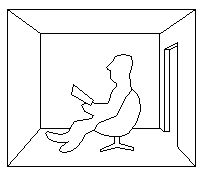
Figure 1 (A)
This much, so far, appears uncontraversial, and would be acceptable to most scientists without question. A full consideration of this statement however leads to a rather significant and interesting conclusion that has not received sufficient attention in either the philosophical or psychological literature, and which has deep implications for the nature of perception and our efforts to model it artificially. The problem, simply stated, is that if your percept of the outside world is a phenomenon occuring within your head, then how is it that it appears to be outside your head?
Consider yourself at this moment reading this paper, as shown in
Figure 1 (A).
Figure 1 (A)

How can this be?